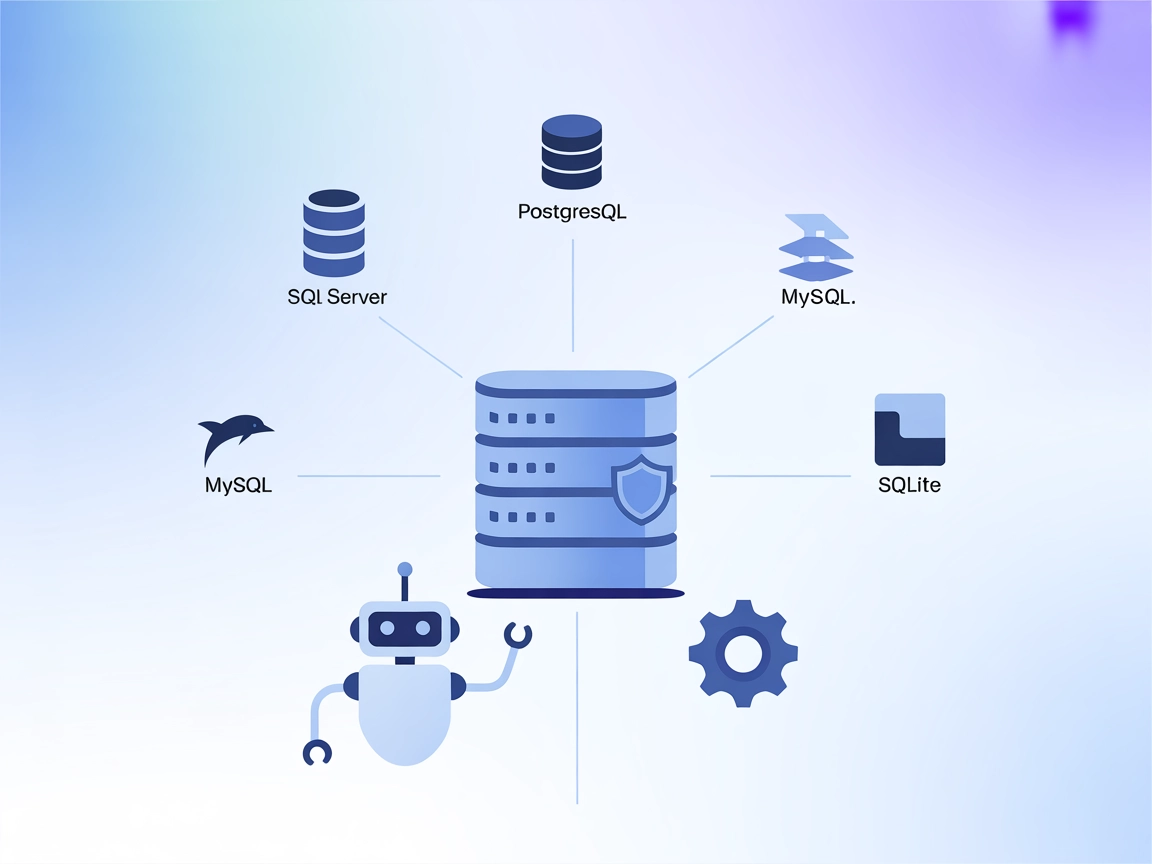
AnalyticDB PostgreSQL MCP Server
The AnalyticDB PostgreSQL MCP Server bridges AI assistants and AnalyticDB PostgreSQL databases, enabling seamless schema exploration, SQL query execution, metad...

Enrich your AI-powered workflows with the AnalyticDB PostgreSQL MCP Server, providing robust, secure, and automated access to advanced database operations directly from FlowHunt.
FlowHunt provides an additional security layer between your internal systems and AI tools, giving you granular control over which tools are accessible from your MCP servers. MCP servers hosted in our infrastructure can be seamlessly integrated with FlowHunt's chatbot as well as popular AI platforms like ChatGPT, Claude, and various AI editors.
AnalyticDB PostgreSQL MCP Server acts as a universal interface between AI assistants and AnalyticDB PostgreSQL databases. This server enables AI agents to seamlessly communicate with AnalyticDB PostgreSQL, allowing them to retrieve database metadata and execute various SQL operations. By exposing database functionalities via the Model Context Protocol (MCP), it empowers AI models to perform tasks such as executing SELECT, DML, and DDL SQL queries, analyzing table statistics, and retrieving schema or table information. This greatly enhances development workflows by automating and streamlining tasks like database queries, schema exploration, and performance analysis from within AI-driven environments.
No prompt templates are mentioned in the repository or documentation.
analyze_table tool to collect and update statistics, improving query optimization and performance tuning.explain_query tool to help developers or AI agents understand and optimize SQL queries.git clone https://github.com/aliyun/alibabacloud-adbpg-mcp-server.git"mcpServers": {
"adbpg-mcp-server": {
"command": "uv",
"args": [
"--directory",
"/path/to/adbpg-mcp-server",
"run",
"adbpg-mcp-server"
],
"env": {
"ADBPG_HOST": "host",
"ADBPG_PORT": "port",
"ADBPG_USER": "username",
"ADBPG_PASSWORD": "password",
"ADBPG_DATABASE": "database"
}
}
}
pip install adbpg_mcp_server"mcpServers": {
"adbpg-mcp-server": {
"command": "uvx",
"args": [
"adbpg_mcp_server"
],
"env": {
"ADBPG_HOST": "host",
"ADBPG_PORT": "port",
"ADBPG_USER": "username",
"ADBPG_PASSWORD": "password",
"ADBPG_DATABASE": "database"
}
}
}
"mcpServers": {
"adbpg-mcp-server": {
"command": "uvx",
"args": [
"adbpg_mcp_server"
],
"env": {
"ADBPG_HOST": "host",
"ADBPG_PORT": "port",
"ADBPG_USER": "username",
"ADBPG_PASSWORD": "password",
"ADBPG_DATABASE": "database"
}
}
}
"mcpServers": {
"adbpg-mcp-server": {
"command": "uvx",
"args": [
"adbpg_mcp_server"
],
"env": {
"ADBPG_HOST": "host",
"ADBPG_PORT": "port",
"ADBPG_USER": "username",
"ADBPG_PASSWORD": "password",
"ADBPG_DATABASE": "database"
}
}
}
Always store sensitive values such as database passwords in environment variables, not in plain-text configuration files. Example:
"env": {
"ADBPG_PASSWORD": "${ADBPG_PASSWORD_ENV}"
}
Configure your system environment variables accordingly for secure integration.
Using MCP in FlowHunt
To integrate MCP servers into your FlowHunt workflow, start by adding the MCP component to your flow and connecting it to your AI agent:

Click on the MCP component to open the configuration panel. In the system MCP configuration section, insert your MCP server details using this JSON format:
{
"adbpg-mcp-server": {
"transport": "streamable_http",
"url": "https://yourmcpserver.example/pathtothemcp/url"
}
}
Once configured, the AI agent is now able to use this MCP as a tool with access to all its functions and capabilities. Remember to change “adbpg-mcp-server” to whatever the actual name of your MCP server is and replace the URL with your own MCP server URL.
| Section | Availability | Details/Notes |
|---|---|---|
| Overview | ✅ | |
| List of Prompts | ⛔ | No prompt templates listed |
| List of Resources | ✅ | Built-in & template |
| List of Tools | ✅ | 5 documented tools |
| Securing API Keys | ✅ | Environment variables |
| Sampling Support (less important in evaluation) | ⛔ | Not mentioned |
A review of this MCP server shows that it has solid documentation for setup, resources, and tools, but lacks prompt templates and does not mention advanced features like Roots or Sampling. Its focus is clearly on database-centric workflows.
| Has a LICENSE | ✅ (Apache-2.0) |
|---|---|
| Has at least one tool | ✅ |
| Number of Forks | 0 |
| Number of Stars | 4 |
Rating:
I would rate this MCP server a 7/10. It is well-documented for basic integration and database use cases, but scores lower due to the absence of prompt templates, advanced MCP features, and low community adoption (stars/forks). For database-focused AI workflows, it is a strong starting point.
It is a middleware that connects AI assistants to AnalyticDB PostgreSQL databases, enabling them to run SQL queries, manage schemas, analyze tables, and retrieve metadata through the Model Context Protocol (MCP).
AI agents can execute SELECT, DML (INSERT/UPDATE/DELETE), and DDL (CREATE/ALTER/DROP) queries, analyze table statistics, fetch schema/table info, and obtain SQL execution plans for optimization.
Database credentials, especially passwords, should be stored in environment variables rather than plain-text configs, ensuring secure integration and preventing credential leaks.
It’s ideal for automating database queries, exploring schemas, updating table statistics, and integrating database operations into AI-powered or automated workflows.
No prompt templates are provided in the current documentation.
As of now, the server has 0 forks and 4 stars on GitHub.
Boost your AI’s capabilities with direct, secure SQL execution and database exploration. Start using AnalyticDB PostgreSQL MCP Server in your flows today!

The AnalyticDB PostgreSQL MCP Server bridges AI assistants and AnalyticDB PostgreSQL databases, enabling seamless schema exploration, SQL query execution, metad...

AnalyticDB for MySQL MCP Server provides a universal interface for connecting AI agents to Alibaba Cloud's AnalyticDB for MySQL, enabling seamless database acce...

The MCP Database Server enables secure, programmatic access to popular databases like SQLite, SQL Server, PostgreSQL, and MySQL for AI assistants and automation...
Cookie Consent
We use cookies to enhance your browsing experience and analyze our traffic. See our privacy policy.